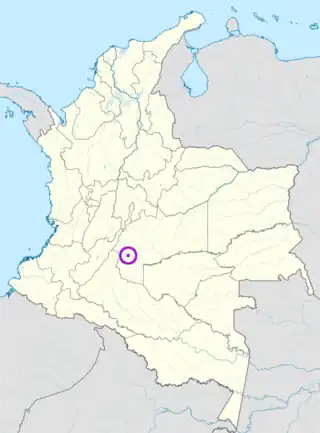| Tinigua | |
|---|---|
| Tiniguas | |
| Native to | Colombia |
| Region | Meta Department, Colombia; Serranía de la Macarena, Colombia |
| Ethnicity | 1[1] |
Native speakers | 1 (2013)[1] |
Tiniguan
| |
| Language codes | |
| ISO 639-3 | tit |
| Glottolog | tini1245 |
| ELP | Tinigua |
 | |
Tinigua (Tiniguas) is an endangered language isolate spoken in Colombia which used to form a small language family with the now extinct Pamigua language.
Final speakers
As of 2000, Tinigua had only two remaining speakers, Sixto Muñoz (Tinigua name: Sɨsɨthio ‘knife’) and his brother, Criterio. Criterio died some time around 2005, leaving behind Sixto as the last remaining speaker of Tinigua.[2] Formerly a resident of the Serranía de la Macarena in Meta Department, Sixto Muñoz currently resides in Jiw village of Barrancón, near the main town of Guaviare Department.[3]: 1029 They lived in Meta Department, between the Upper Guayabero and Yari rivers.[4]
Muñoz also speaks Spanish and is thought to have been born somewhere from 1924-1929. He has five children, but he chose not to teach them Tinigua because they would not have any use for it.[5]
Below is a comparison of Tinigua forms elicited from Sixto Muñoz in 2019 compared with Tinigua and Pamigua words recorded in Castellví (1940).[6][3]
English gloss Tinigua (Sixto Muñoz) Tinigua (Castellví) Pamigua (Castellví) eye sıt̵́i zőti, zɘ̀ti sete, xete water ɲikʷájtʃi ñikwáiši nikagé fire hikʰítsa ičísa ekísa woman ɲísa ñíza, ñísä nixtá dog hanó xamno, xámiu xannó jaguar kʰíɲa ~ tʃíɲa číña, ǰíña, xiña xiñaga corn jóʔhá t’óka, tióka xukxá manioc komáha xaačá xoayoa let's go minahá manaxǎí menáxa chili pepper tsákha ţáxa saxa good hajohási ayuxáǐ ayoxagua (‘good morning’) plantain mandótha madóxa mandotá spirit hamajiéha pan-kianóso kinoxá (‘enemy’) man tsɨtsía psäţeyá piksiga five tsátokwahá (tsátho-kwaʔa ‘left.side-hand’) xopa-kuáxa saksu-kuaxa eleven tapásaɲóha čimatóse-kiésä čipsé ipa-kiaxi
References
- 1 2 Tinigua at Ethnologue (18th ed., 2015) (subscription required)
- ↑ ""Su cultura y lengua morirán con él"". BBC News Mundo (in Spanish).
- 1 2 Epps, Patience; Michael, Lev, eds. (2023). Amazonian Languages: Language Isolates. Volume II: Kanoé to Yurakaré. Berlin: Walter de Gruyter. ISBN 978-3-11-043273-2.
- ↑ Tobal, Juan Pablo (21 February 2013). "El último Tinígua" (in Spanish). La Voz.
- ↑ ""Su cultura y lengua morirán con él"". BBC News Mundo (in Spanish).
- ↑ Castellví, F. Marcelino de. 1940. La lengua tinigua. Journal de la Société des Americanistes de Paris 32. 93–101.
Further reading
- Brenzinger, Matthias (2007). Language diversity endangered. 181. Vol. Trends in Linguistics: Studies and monographs. Walter de Gruyter. p. 23. ISBN 978-3-11-017050-4. Retrieved 2009-08-28.
- Moseley, Christopher (2007). Encyclopedia of the world's endangered languages. Routledge. p. 40. ISBN 978-0-7007-1197-0. Retrieved 2009-09-19.